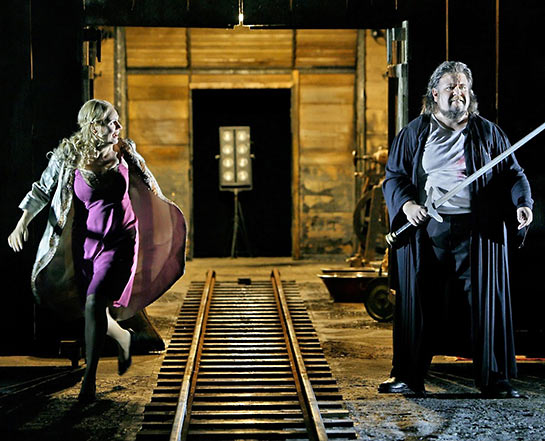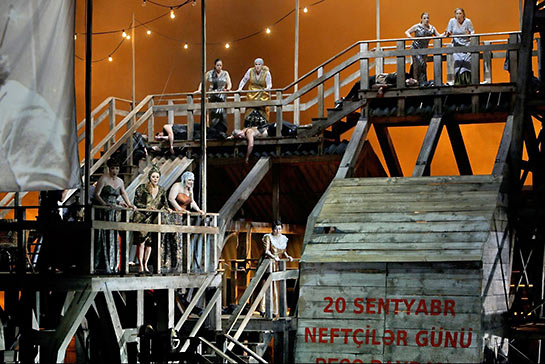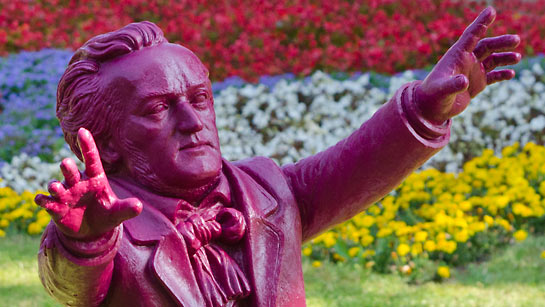Bayreuth Festival (2) - Die Walküre, Bayreuth, 28 July 2014 (Castorf/Petrenko)

Bayreuth Festspielhaus
Siegmund – Johan Botha
Hunding – Kwangchul Youn
Wotan – Wolfgang Koch
Sieglinde – Anja Kampe
Brünnhilde – Catherine Foster
Fricka, Waltraute – Claudia Mahnke
Gerhilde – Allison Oakes
Ortlinde – Dara Hobbs
Schwertleite – Nadine Weissmann
Helmwige – Christiane Kohl
Siegrune – Julia Rutigliano
Grimgerde – Okka van der Damerau
Roßweiße – Aleksandra Petersamer
Frank Castorf (director)
Aleksander Denić (set designs)
Adriana Braga Peretski (costumes)
Rainer Casper (lighting)
Andreas Deinert, Jens Crull (video)
Bayreuth Festival Orchestra
Kirill Petrenko (conductor)
If Frank Castorf’s Rheingold proves somewhat frustrating in its alternation between genuine dramatic power and what seemed to be boredom on the director’s part, frustration here in Die Walküre tilts more strongly in the direction of the latter. It is eventually revealed that we are in Azerbaijan, oil exploration rearing its head more overtly: Baku, 1942, for some reason, or not. So far, in its reversion from a later-twentieth century Rheingold, so ‘post-dramatic’, perhaps. Wagner plays with time, of course, especially through his web of motifs; he even, like the Bible, has two creation myths, that of Alberich in the first scene of Das Rheingold, that of Wotan as recounted by the Norns in Götterdämmerung. Narrations provide us with new information, new standpoints, but there is nevertheless always a coherent narrative, however incomplete it may be. In Wagner, that is. In Castorf, incoherence seems deliberately to be the thing. That might be interesting, but the problem is more that relatively little is done with it. A decidedly sporadic engagement with Wagner results in something which, ironically, comes more and more to resemble an old-fashioned approach of ‘park and bark’.
Too much of what we see proves to be just a setting, against which the singers essentially sing their parts. Aleksander Denić ingenious set, Hunding’s farm house transforming into an oil well, and film clips showing anything and everything from a woman eating cake to an issue of Pravda, a man on the telephone (it later seems that he might be Wotan, but our unreliable narration kicks in again, not unfruitfully) to a reappearance for the Rheingold barman, now in Azerbaijani oil man guise, are too often little more than scenery. I can only assume that Wotan’s delivery of his second-act monologue is purposely stationary, even un-directed: attempted deconstruction, perhaps, of the plethora of action in Castorf’s Rheingold, a reinstatement, presumably contemptuous, of ‘opera’ as he perceives it, but certainly not as Wagner did. Certainly Fricka’s mad behaviour is the most conventionally ‘operatic’ I have ever seen and could hardly contrast more strongly with Wotan’s subsequent standing and (mostly) delivering. Much the same happens in the greater part of the third act, once the other Valkyries, some with horned helmets, have departed the scene. It frankly becomes boring, the impression having been given, rightly or wrongly, that often the singers have been left to fend for themselves.

Castorf seemingly has little interest in the Lenz of the Volsungs’ love, Siegmund’s heroic rejection of Valhalla, or the relationship between Wotan and Brünnhilde, and in much else besides, without succeeding in putting anything in their place. Romanticism, or something akin to it, is presumably part of the problem – but that should surely prove a spur to criticism rather than an aid to indifference. It seems less a matter of failing to explore or to deconstruct Wagner’s ideas than of never having bothered to consider them in the first place. Narrative incoherence is clearly part of the point, but, even with the film, it does not carry enough weight to compensate for what is lost. And there is a very thin line between incoherence as an æsthetic principle and incoherence by default.
Kirill Petrenko’s conducting had improved considerably. After a largely one-dimensional Rheingold, there was far greater ebb and flow here. If tempi remained on the fast side, the music was nevertheless allowed to breathe, which was just as well, given how much it had to fend for itself. There was far greater variegation, woodwind lines in particular gaining new life, and impressive dynamic range: none of Pierre Monteux’s ‘indifference of mezzo forte’. Climaxes could have been more shattering, but they were generally well placed and well approached. It is difficult to know how differently Petrenko would approach the work in another production, but I wonder how much a laudable desire to unite music and Wagner’s ‘gesture’ had initially led to subordination of the former, only for Castorf’s apparent dramatic abdication in Die Walküre to be met with a greater role for Petrenko here. Perhaps Siegfried and Götterdämmerung will provide further hints.
Wolfgang Koch’s Wotan is too baritonal truly to plumb the dramatic depths, but his Act III anger was devastating to hear (if not to see). After a disastrous start, her Hojotohos out of sync with the orchestra, Catherine Foster recovered with considerable credit as Brünnhilde. Her diction is not always as clear as it might be; indeed, there were, unless my ears deceived me, a few lapses with regard to the poem itself. But she is a likeable singer, who draws one in, has one sympathise. Anja Kampe had some rough moments, especially earlier on, but offered a performance of true dramatic fire; she, it seemed, was really the only one who could provide the direction Castorf apparently declined. At her best, she was mesmerising, even shattering. In Johan Botha, it was a joy to have someone who can sing the role of Siegmund with such ease. His swordsmanship, however, was embarrassing, his acting skills remaining at best rudimentary. Kwangchul Youn’s Hunding was powerfully, menacingly sung, his attention to words as well as music an object lesson, not least to the director. Claudia Mahnke’s ‘operatic’ Fricka was rather hit and miss, just as in Das Rheingold. The Valkyries were a generally impressive bunch, with more of Wagner’s poem audible and comprehensible than is generally the case.
Mark Berry is Professor of Music and Intellectual History at Royal Holloway, University of London and will be a visiting scholar at the Humboldt University, Berlin, for the academic year 2023-4. He is the author of Treacherous Bonds and Laughing Fire: Politics and Religion in Wagner’s ‘Ring’ (2006), After Wagner: Histories of Modernist Music Drama from ‘Parsifal’ to Nono (2014), and Arnold Schoenberg (2019), and co-editor with Nicholas Vazsonyi of The Cambridge Companion to Wagner’s ‘Der Ring des Nibelungen’ (2020). His reviews of concert and opera performances are collected on his blog, Boulezian.

Interviews, reviews and articles
- Man geht aus dieser maßstabsetzenden Produktion selbst nach fast zwanzig Stunden Dauer nur ungern heraus, und ist im Geiste noch tagelang sowohl mit den Bildern wie mit der bereits öfter gerühmten musikalischen Gestaltung durch Kirill Petrenko beschäftigt. (Stuttgarter Zeitung, 2014)
- Mark Berry on Frank Castorf's Ring production: Das Rheingold - Die Walküre - Siegfried - Götterdämmerung
- Martin Kettle: "Castorf seems like a living embodiment of the Ring's villain, Alberich, who steals the gold, renounces love and wants to rule the world." (The Guardian)
- The Guardian Review: Das Rheingold and Die Wälkure
- The Guardian Review: Siegfried and Götterdämmerung
- "Like many theatre directors who attempt to save opera from itself, Franz Castorf ends up repeating clichés" (Financial Times)
- "If opera direction has run so dry that there is nothing left to do but ignore, fragment and provoke, the point of having a Bayreuth Festival at all must surely be called into question. [...] The new Bayreuth Ring is not just a scandal, and not only a musical triumph. It is a crisis of content for the Wagner Festival, and calls into question the future of the genre." (Financial Times)
- Juvenile pranks aside, its surreal grandeur stays in the mind. The real problem is that it attempts an excessively contorted maneuver: a double deconstruction, both of traditional, swords-and-dragons Wagner and of latter-day political interventions in that tradition. (Alex Ross / The New Yorker)
- 'Ring' director Castorf (1): 'Artistic terrorism' in Bayreuth (Deutsche Welle)
- Director Castorf (2): Art is about exceptional states (Deutsche Welle)
- Castorf inszeniert Bayreuther „Ring“ als Reise zum Erdöl ... Musik: Castorf inszeniert Bayreuther „Ring“ als Reise zum Erdöl
- Was Castorf für seinen "Ring" in Bayreuth plant
- Der Spiegel: "Götterdämmerung" in Bayreuth: Von Walhalla zur Wall Street
- Castorf, ganz Kind der Postmoderne, macht aus diesem Gestus: Schluss mit dem Kunstgeheule! Schluss mit der Interpretation der Interpretation der Interpretation! (Christine Lemke-Matwey / Die Zeit)
- Castorf takes an essentially non-Wagnerian view of the work. The result is a provocative, irritating yet fascinating production that could best be described as an 'imploded' work of art.
Wagneropera.net (2013)
The Bayreuth Festival 2017 Reviews
Mark Berry: Die Meistersinger von Nürnberg (Kosky/Jordan)
Sam Goodyear: Die Meistersinger von Nürnberg (Kosky/Jordan)
Mark Berry: Parsifal (Laufenberg/Haenchen)
Mark Berry: Das Rheingold (Castorf/Janowski)
Mark Berry: Die Walküre (Castorf/Janowski)
Mark Berry: Siegfried (Castorf/Janowski)
Mark Berry: Götterdämmerung (Castorf/Janowski)
Reviews by Mark Berry on Wagneropera.net
Bayreuth Festival
- Bayreuth 2022: Das Rheingold (Valentin Schwarz / Cornelius Meister)
- Bayreuth 2022: Die Walküre (Valentin Schwarz / Cornelius Meister)
- Bayreuth 2022: Siegfried (Valentin Schwarz / Cornelius Meister)
- Bayreuth 2022: Götterdämmerung (Valentin Schwarz / Cornelius Meister)
- Bayreuth 2019: Tannhäuser (Tobias Kratzer / Christian Thielemann)
- Bayreuth 2019: Lohengrin (Yuval Sharon / Christian Thielemann)
- Bayreuth 2019: Die Meistersinger von Nürnberg (Kosky/Jordan)
- Bayreuth 2019: Tristan und Isolde (Katharina Wagner/Christian Thielemann)
- Bayreuth 2017: Die Meistersinger von Nürnberg (Kosky/Jordan)
- Bayreuth 2017: Parsifal (Uwe Eric Laufenberg / Hartmut Haenchen)
- Bayreuth 2017: Das Rheingold (Frank Castorf / Marek Janowski)
- Bayreuth 2017: Die Walküre (Frank Castorf / Marek Janowski)
- Bayreuth 2017: Siegfried (Castorf/Janowski)
- Bayreuth 2017: Götterdämmerung (Castorf/Janowski)
- Bayreuth 2016: Parsifal (Uwe Eric Laufenberg / Hartmut Haenchen)
- Bayreuth 2016: Tristan und Isolde (Katharina Wagner / Christian Thielemann)
- Bayreuth 2016: Götterdämmerung (Frank Castorf / Marek Janowski)
- Bayreuth-2016: Siegfried (Frank Castorf / Marek Janowski)
- Bayreuth 2016: Die Walküre (Frank Castorf / Marek Janowski)
- Bayreuth 2016: Das Rheingold (Frank Castorf / Marek Janowski)
- Bayreuth 2014: Frank Castorf Ring: Das Rheingold
- Bayreuth 2014: Frank Castorf Ring: Die Walküre
- Bayreuth 2014: Frank Castorf Ring: Siegfried
- Bayreuth 2014: Frank Castorf Ring: Götterdämmerung
- Bayreuth 2014: Lohengrin
- Bayreuth 2012: Stefan Herheim's Parsifal
- Bayreuth 2012: Gloger's Dutchman
- Bayreuth 2012: Neuenfels Lohengrin
- Bayreuth 2011: Tannhäuser (Baumgarten)
- Bayreuth 2011: Stefan Herheim Parsifal
- Bayreuth 2011: Marthaler Tristan und Isolde
- Bayreuth 2011: Neuenfels Lohengrin
- Bayreuth 2011: The Ring for Children
More Reviews
- Berlin 2010 Cassiers Ring
- ROH 2009: Loy's Tristan
- ROH 2010: Tim Albery's Tannhäuser
- ROH 2011 Tim Albery's Dutchman
- Daniel Barenboim: Complete Wagner Operas (34 CD)
Der Ring des Nibelungen: Articles and Reviews
Nila Parly on Regietheater: Visions of the Ring
The Cry of the Valkyrie: Feminism and Corporality in the Copenhagen Ring
Sam Goodyear, Bayreuth 2022: Der Ring des Nibelungen (Valentin Schwarz)
Mark Berry, Bayreuth 2022: Das Rheingold (Valentin Schwarz)
Mark Berry, Bayreuth 2022: Die Walküre (Valentin Schwarz)
Mark Berry, Bayreuth 2022: Siegfried (Valentin Schwarz)
Mark Berry, Bayreuth 2022: Götterdämmerung (Valentin Schwarz)
Mark Berry: Bayreuth 2017: Das Rheingold (Frank Castorf / Marek Janowski)
Mark Berry: Bayreuth 2017: Die Walküre (Frank Castorf / Marek Janowski)
Mark Berry: Bayreuth 2016: Das Rheingold (Frank Castorf)
Mark Berry: Bayreuth 2016: Die Walküre (Frank Castorf)
Mark Berry: Bayreuth 2016: Siegfried (Frank Castorf)
Mark Berry: Bayreuth 2016: Götterdämmerung (Frank Castorf)
Mark Berry: Bayreuth 2014: Das Rheingold (Frank Castorf)
Mark Berry: Bayreuth 2014: Die Walküre (Frank Castorf)
Mark Berry: Bayreuth 2014: Siegfried (Frank Castorf)
Mark Berry: Bayreuth 2014: Götterdämmerung (Frank Castorf)
Per-Erik Skramstad: Bayreuth 2013: There Will Be Blood: Frank Castorf Has Entered the Ring
Per-Erik Skramstad: Bayreuth 2010: Curtain Down on Tankred Dorst's Ring
Mark Berry: 2010 Cassiers Ring
Sam Goodyear: Laufenberg’s Wiesbaden Ring 2017
Jerry Floyd: Rheingold, Metropolitan 2010
Jerry Floyd: Die Walküre, Metropolitan 2010
Jerry Floyd Washington National Opera: Siegfried
Jerry Floyd Washington National Opera: Siegfried II
Jerry Floyd Washington National Opera: Götterdammerung Concert (2009)
Jerry Floyd Washington National Opera: Götterdammerung Concert (2009)
Mark Berry: Richard Wagner für Kinder – Der Ring des Nibelungen (2011)



